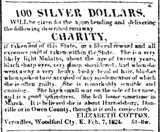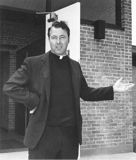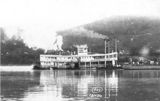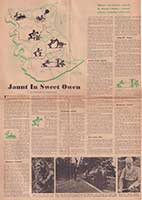
Abram, or sometimes Abraham, Owen
| Owen County, and Owenton, are named for Abram Owen. Owensboro and Owen County, Indiana are also named for him. More on him at his Wikipedia page. Owen County was the 63rd county formed in Kentucky. The law enacting Owen County was passed on February 6, 1819 and the county was formed on April 12, 1819 from a parts of Franklin, Gallatin, Scott and Pendleton Counties. Its boundaries are unchanged since February 9, 1876. It has an area of 352.1 square miles, making it the 44th largest of Kentucky's 120 counties. |
| The county organizes first met on April 12, 1819 in Hesler, then called Heslerville. It was presumed Hesler would be the county seat, but changes in county boundaries made Owenton the center of the county, and the county seat was ordered moved to Owenton on January 15, 1822. |
Discover the highest point in Owen county.
![]()
Chicago's Newberry Library has posted online a complete set of maps of American counties formations. They start with the date of county formation, and trace every little change to the boundaries after that. Owen County has had 4 such changes, and you can see the Owen maps here (pdf). To see the counties from which the county was formed, you'll have to download the entire Kentucky state pdf. There's also a feature that you can use to import all this data into Google maps. Good stuff! |
![]()
|
“Aunt Polly Rogers, who has reached the good old age of 97 years, was in Owenton last Monday, the first time in thirty-five years, although she has lived within five miles of the town for more than half of a century. She had her picture taken for the first time in her life and visited the Herald office to see how newspapers are made. When asked if she had ever been to Louisville or Cincinnati, she replied 'Bless your life, no, and I wouldn't ride on a steam car for anything.'” from The Warsaw Independent, of 11-26-1898: |
A history of newspapers in Owen County.
“Owenton would enjoy lively sensation
just now. Gossip languors from a depletion of
nutrition, but we predict the old gal will not die of starvation.
Our frailties are many.”
The Owenton Democrat, April 1, 1887
You'll not want to miss a 1923 Louisville Herald article
by Ralph Coghlan on the history of Owen County, here.
![]()
 |
|
| USS W. A. Lee | Vice Admiral Lee |
Midshipman Lee went on to become Vice Admiral Willis A. Lee, one of Owen County's most famous sons.
He was born in Natlee. Find out more about him at
this site. The ship the US Navy named after him - a destroyer - is at
this site.
| “The annual
competition for three prizes for marksmanship was held at the Naval
Academy rifle range this afternoon, May 25th. Midshipman W. A. Lee (Wikipedia) of Owenton, Ky., captured the gold medal.” New York Times, May 26, 1907. |
![]()
As a part of the WPA Writers Project, John Forsee, one-time editor of the News-Herald, wrote a history
of Owen County and Owenton in the 1930's. It's in six chapters, all pdf's.
| Part 1: History of Owen County | Part 4: Accommodations |
| Part 2: History of Owenton | Part 5: Miss Hill's History |
| Part 3: Story of the Civil War | Part 6: Game Refuges, Art, Literature, and Religion |
![]()
Charity, 1824
John Forsee was an early editor of the News-Herald and a native Owen Countian, in addition to his history of the county in 1936 under the Federal Writers’ Project, he also interviewed former enslaved people about their lives in Owen County. The slave narrative is here (128 page pdf). Thanks to Terry Combs-Caldwell for updating us on Forsee. |
|
| The Boone County Library has a web site detailing known escapes of enslaved people from Northern Kentucky. The Trimble-Carroll-Owen only list is here. | |
 Freedom's Journal, June 8, 1827 |
An 1866 lynching. |
| Racial insurrection in Owen County in 1861? Details, or maybe rumors, here. | The account of the 1892 lynching of Lego Gibson is here. |
| “October 9th, 1840. Know all men by these presence, that Gordon Thomas of the country of Owen and state of Ky., does this day bargain and sell unto William Smither of the county and state of aforesaid on negro boy, by the name of Con for the sum of six hundred dollars, to me in hand paid which boy was to be a slave for life also sound with the exception of tisit, also bind myself if the aforesaid Smither finds the tisit to inger the aforesaid metaboy - in one of two years, bind myself to take back said boy Con and pay the forenamed sum. Gordon Thomas.” | |
| Reward is out for the escaped Lansy. | An escaping enslaved person of Owen County's Mr. Ford tells his story. |
| “Information wanted of two brothers and one sister, whose names are Ambrose Dudly Carroll, Phelix Gurry Carroll and Polina Carroll, respectively. Our former owner was Foster Mundy, whose sold them to the Negro trader. Any information concerning them will be thankfully received by Mrs. Adeline Sanders, Owenton, Ky.” The Christian Recorder, November 5, 1896 | |
| “TWO HUNDRED DOLLARS REWARD. TWO NEGROES. Ran away from the subscriber, living in Louisville, on the 2nd, one negro man and girl. The man's name is MILES. He is about 5 feet, 8 inches high, dark brown colour, with a large scar upon his head, as if caused from a burn; about 25 years; and had with him two carpet sacks, one of cloth, the other enameled leather; also a pass from Louisville to Owenton, Owen County, Ky., and back. The girl's name is Julia, and she is of light brown colour, short and heavy set, rather good-looking, with a scar upon her forehead; had on a plain silk dress when she left, and took the other clothes with her; looks to be about 16 years of age. The above reward will be paid for the man, if taken out of state, or 100 dollars for the girl; 100 dollars for the man if taken in the State, or 50 dollars for the girl. In either event they are to be secured, so I get them. John W. Lynn.” from the Louisville Daily Journal, October 23, 1852 | |
| “A negro was lynched in Owen county, Kentucky, on Wednesday last, for an attempt at rape on a respectable white girl. It was with great difficulty that the infuriated people were restrained from roasting him over a slow fire.” Indianapolis Daily Herald, October 12, 1866 | |
| “A slave in Owen Co. Ky. has been murdered by his master and another man, without any material provocation.” Freedom’s Journal, June 8, 1827 | Not all African-Americans favored the party of Emancipation. |

Philadelphia's North American, September 19, 1853

Louisville Daily Courier, October 4, 1852
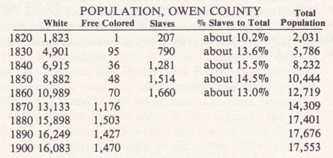

Nineteenth century population chart
.![]()
This list of Owen County deaths from WWII
is from
the National Archives. There's a key to what
the
various abbreviations mean here, and the
actual list is here.
The World War I list is here.
In WWI, Owenton's Frank Ford was awarded the Distinguished Service Cross. Read about him here.
![]()

Philadelphia North American, February 20, 1877
![]() The lynching of Dick Shuck, and the related lynchings of the Goodrich's in Henry County.
The lynching of Dick Shuck, and the related lynchings of the Goodrich's in Henry County.
Evidently, the whereabouts of his hood was an issue.
| Advocating for a telegraph in 1860, here. |
|
| 1879 Jail escaped foiled. | Owen County Association of Baptists formed in 1953, details. |
| On July 7, 1915 a terrible tornado hit northern Kentucky. There's a story of the Owen County damage here, and here (“most destructive flood that ever visited Owen county“). For much more coverage on the Northern Kentucky damage, go here. And a week later, this storm hit Owen County. | |
| In 1906, the Courier-Journal published a list of out-of-state residents who would come home to Owen County. | “John Branham, a wife murderer of Owen county, Kentucky was taken out of jail by an armed mob yesterday and hanged by the neck until he was dead, dead. The frequent recurrence of these lynching affairs in Kentucky is disgraceful, yet there is some satisfaction in knowing that this one was conducted ‘quietly.’” Indianapolis Journal, May 31, 1872 |
| In 1902, the Courier-Journal ran a surprisingly detailed story on the first Rural Free Delivery in Owen County | |
| James Dorman was born on Eagle Hill above Glencoe in 1831. You can read his account (pdf) of his life. | Richard Collins, editor of the Maysville Eagle for a period, expanded his father Lewis Collins' History of Kentucky in 1874, and included this section (pdf) on the history of Owen County. |
| In 1850, Owen County had 15 Baptist, three Methodist, and seven Christian Churches. | “In 1817 the third church in Owen County soil was organized, It was an outgrowth of the Mountain Island Church, and was later called Mussel Shoals Baptist church.” - Marian Sidebottom Houchens in her History of Owen County, Kentucky |
|
Breckenridge Cites “Sweet Owen.” The story's here. |
The Owen County Library's web site has a page that has scans of every Owen County High School Yearbook from 1951 thru 2015. |
| Doris Shell Gill has compiled a listing of all of the Owen County tavern licenses from 1842 to 1853. Read it here. (pdf) | The News-Herald printed this list of one-room schools in Owen County. We don't know if this is a specific year (the schools could change from year to year), or whether it's cumulative. |
![]()
| Judges in Owen County seem to run the gamut from eminent jurists to nut cases: | |
| Judge Nutall. Nutall again. | Owen County's Judge Perry disappears, story here. (pdf) |
| In 1870, Judge Pryor, tells the grand jury, in no uncertain terms, to enforce the law, regardless, here. | In 1874, Judge McManama delivers an even more emphatic charge to the grand jury, here. |
“The Owen News has this item: ‘On last Saturday, a case coming up before our County Prosecutor, J. W. Perry, wherein the liberty of a white man was at stake, and where a portion of the witnesses were negroes, he refused to swear and take their testimony. He says he will not take the negro testimony where the liberties of white citizens are involved.’” Courier-Journal, April 6, 1872 |
Col. Thomas Buford assassinated Judge John Elliott in Henry County, but the trail was moved to Owen. It was a major event in Owenton, and got national press coverage. Story's here. (pdf) |
| Owen County Resources, c. 1935 | |
![]()
Owen County gets a bookmobile
from the News-Herald. September 23, 1954
 Cincinnati Commercial Tribune, April 8, 1882 |
 Cincinnati Commercial , February 12, 1879 |
The Rev. Albert Ruschman wrote a history of the Catholic Churches of Owen County. Read it here (pdf).
| A List of the Owen County Historical Markers is at this site. | In 1879, New York Times calls Owen Countians “ignoramuses.” Here. | Provost Marshall Killed, 1864, here. | |
| The Greenup's Fork Baptist Church sells their property. | Citizens protest having to do their share of the roadwork, here. | Lawyers of Owen County, 1872, here. | |
| Charles Johnson has written on Buffalo Trails and Indian Encampment - Prelude to Present-Day Owen County from the Central States Archaeological Journal, October, 1958 | Owen County bootlegger nabbed in 1874, here. | 10,000 people attend Taft Highway opening. Story here. and follow-up here. | |
| A List of men from Owen County who went to the Kentucky penitentiary, from 1798 through 1834, is here. | Sparta citizen lynched, 1872. Story here. (It's gruesome) | There are two Owen Counties in the US - the other one is Owen County, Indiana. |
The 1925 bus schedule from Owenton to Covington is here. |
| Mrs. Florence Schoeffel (1860 - April 16, 1900) died at her residence, 69 Madison Avenue in New York City. She was married to General George Schoeffel, and was born and grew up in Owenton. She's the author of a number of novels she wrote under the pseudonym “Wenona Gilman.” Her most popular title was Saddle and Sentiment, a story of Kentucky life. (NKYViews bought and attempted to read her novel The Lady of Beaufort Park. We made it thru three pages. Horrible stuff.) | “The little town of Owenton, Ky., boasts of 121 men born within its limits who have become cashiers of banks. They are scattered through the States of Kentucky, Indiana, and Ohio.” The New York Times, September 20, 1903. | ||
| “If Owen is not an open town for the sale of intoxicants, we have more generous “treaters” to the square inch than any town in the state.” News Herald, April 30, 1908 | “Mrs. Field closed a series of temperance lectures Tuesday night. Two-hundred and sixty signed the pledge and put on the ribbon.” Owen County Democrat, March 11, 1886. | ||
| In 1969, Edna Talbott Whitley compiled a list of Cabinetmakers in Kentucky. The Owen County portion of that list is here. | Leading Owen County Citizens of 1847, here. | A few words on the Greenup Fork Baptist Church can be found here. (pdf) | |
| “As late as 1843, there were only three pairs of gold spectacles, 14 gold watches, 15 silver watches, and three pianos in the whole county.” - Marian Sidebottom Houchens in her History of Owen County, Kentucky | Marian Sidebottom Houchens updated Edgar Morgan's The Cobbs of Owen County, Kentucky, available on-line at this site. (215 pages) | ||
| In 1930, Kentucky Progress Magazine ran a feature letting each of Kentucky's counties list their accomplishments for 1929. What Owen County came up with is here. (pdf) | The editor of the News-Herald takes a field trip to New Liberty and Wheatley in 1905. What he wrote about his trip is here. | ||
| Data on Owen County state banks of 1907 are here; national banks here. | Owen County Sheriff in shootout in Carrollton, here. | “James P. Jump is the champion egg-eater of Owen county, Kentucky, and proved his right to the title the other day by devouring twenty-two eggs. He wants to eat eggs against any man in the State for $50.” Indianapolis News, March 5, 1895 |
|
| Lynching threatened in Owenton in 1903, here. | Camp Meeting in Dallasburg goes for three days, story here. | The failure of a 1902 lynch mob, here. | A site dedicated to the bridges of Owen County is here. |
| The state authorizes Owen County to collect taxes to pay for Eagle Creek bridges at Sparta, Glencoe, and Lee's Mills. | |||
| Report from Owen County Kentucky By J. W. Cammack from the Handbook of Kentucky by the Kentucky Department of Agriculture, 1908, here. (pdf) | “A woman has been presented to the grand jury of Owen county on the charge of being a witch.” Courier Journal, May 18, 1869 More. | “The Owen News reports the passage though Owenton of a Mormon elder named Smoot, to visit cousin G. W. Smoot, near Pleasant Home, Owen county. Elder Smoot was born in Owen county and emigrated to Utah forty years ago. He has five wives and twenty-two children and is very rich. It is also said that he has a wife yet living in Owen county, to whom he was married before he left.” Courier-Journal, December 18, 1880 | |
| The Sponsors of the 1907 Tri-County (Carroll, Gallatin, Owen) Fair in Sanders are listed here. (pdf) 60 Pages of ads from merchants of those three counties, plus Vevay. Thanks to Dale Samuel for the images. | A status report from the Superintendent of Schools in Owen from 1900 is here. The 1907 report is here. | ||
| Owen Co. Fair, 1866. | Owen Co. Fair, 1867. | Owen Co. Fair, 1869. | Two women in crime. |
| Auntie Gross turns 103, here. | In 1944, a California newspaper sent a reporter around the country to write feature articles on various towns. He found Owenton, and wrote this piece. | Accounts of the 1876 lynching of Henry Smith and Squire Hammond are here, and here. | An Overview of Kentucky River Locks and Dams, here. |
| “The Legislature should certainly give their attention to some necessary laws if they would escape the everlasting condemnation of the people. They should by all means make provision for the negro school tax to go for their education. The should provide for the Vienna Exposition and aid the emigration movement, so as to gain a new class of laborers in the State, coming from Europe.” Courier-Journal, April 4, 1873, quoting the Owen News. | Politics. 1892. Here. | An 1835 auction to settled an estate has items sold and prices brought. It's a pdf, here. | |
“Dr. Newton passed 27 rebels near Knoxville, [Pendleton County] Ky., at 8 o'clock this morning. A force of 400 rebels under Major Van Hook, of Morgan's staff were following them. They crossed the turnpike at Tucker, six miles north of Williamstown, at 6:30 P. M. yesterday. They said their destination was Owen county , where they expect to be largely reinforced. Dr. Newton saw a good many more en route to join this force.” The Weekly Vincennes Western Sun, June 18, 1864 |
Col. J. D. Morris reports (pdf) on his experiences in Owen County. | ||
| The Geological Survey of Kentucky did a geological analysis of Owen County in 1856. Read it here. (pdf) | In 1937 UK released surveys of known archaeological sites by county. Owen County’s is here (pdf). | An account of the Eagle Valley Hotel, near Sanders, is here. | |
 Cincinnati Commercial Tribune, July 31, 1881 |
There was push to get a railroad, or a traction line, from Owenton, to Dry Ridge, to connect to the Southern | ||
| True love equals getting the measles? Here. | There are some Owen County cemetery records are at a site here. | A 1917 view of Owen County is here. (pdf) | Owen County related excerpts from Collins' History of Kentucky are here. |
| “Owenton, Ky., June 8 - Surveyors are at work in the route of the new railroad from Worthville to Carrollton. The new road will be a continuation of the Worthville and Carrollton Road. All of the right-of-way has been donated and the money is insight to build the road. The road, after leaving Worthville, Continues up Eagle Creek until it strikes Twin Creek, following that stream to New Liberty, and thence by way of Harrisburg to Owenton. The cost of construction is figured at $20,000 per mile. The distance is 17 miles.” from the Cincinnati Enquirer, June 9, 1906 | |||
| J. W. Waldrop's 1914 description of Owenton in 1854 is here. | The Owen County Democrat says county's roads are a disgrace. | In Owenton in 1891, Dr. James L. Massie shoots and kills J. L. Kenakee over a slander. More here. | Owen County sites placed on the National Places of Historical Places are at a site here. |
| Gratz' Otto Smithers talks about Kentucky River steamers, here. (pdf) | Mexican General Santa Ana born in Owen County? | ||
| There was discussion in 1963 about an Eagle Creek dam and reservoir which would affect land in Grant and Owen Counties, and would extend 35 miles up Eagle Creek. Tributaries affected would be Elk, Buck Elk, three Forks, rattlesnake, Straight Fork, Stevens Creek, Grassy Run, and Dark Hollow Branch. | |||
|
“Owenton, Ky., Sept. 25 – Gov. Beckham was given an ovation here today by the
largest crowd that has gathered in Owen county for a long while. He spoke at
the Fair Grounds this afternoon, and was heard by no less than 5,000 people.
In the vast audience there was scarce a man, woman, or child who did not wear a
[William Jennings] Bryan and Beckham button, and the reception given the nominee
could not have been more cordial.” |
Sparta, Ky., Sept. 25 – Gov. Beckham and Representatives Trimble and Cantrill arrived here at 6 o’clock from Owenton and spoke tonight to a crowd of about 500 people from the porch of the Kelly Hotel. The speakers had no appointment here, and the meeting was an impromptu affair. Voters in the vicinity heard that Gov. Beckham was to come here on his way to Louisville, and they turned out to meet him.” Courier-Journal, September 29, 1900. | ||
| Change in the Kemper's Mill Turnpike is authorized in 1868. | Owen County prisoner becomes slave labor on the railroad, 1882. | ||
| The turnpike from Owenton to Sparta to span Eagle Creek, is authorized in 1868. | “Only $2,500 is lacking in subscriptions to the Owenton and Stamping Ground turnpike. It will be constructed.” Courier-Journal, June 16, 1877 | ||
| Here are two news items reprinted from the Owenton paper in the Boone County Recorder. The first one is a crime story, but note the second story about a madstone. And if you need more background on what a madstone is, by all means, brush up on this fascinating but arcane piece of folklore at this site. | |||
| Detailed Presidential voting statistics from Owen County are here. | A little gallows humor – no, literally – from 1886 is here. | Bio of Physician Robert Hardin Gale is here. (pdf) | Bio of Lawyer James A. Violett, here. |
The Kentucky Department of Agriculture's assessment of agriculture in Owen County, in 1898-1899 can be found here. (pdf)
In 1919, there was a farm census, counting livestock, crops and farms. Owen County's is here.
A toast, in Owenton, from 1823.
We know this one-room school is in Owen, but don't know where, or who.
The end of one-room schools in Owen Co. in 1937. Story here.
In his 1936 masters thesis, “History of Education in Owen County,” Capitola Simpson added a chart of all of the Owen one-room schools by the type of building. |
“In the 1920's, Owen County had two types of public schools: the County School System, and the Independent Graded School. The County School System operated about 60 one-room elementary schools, in addition to graded and four-year high schools at Gratz, Lusby's Mill, Monterey and New Columbus. For a short period of time, the County maintained at two-year high school at Hesler. Independent graded and four-year high schools were located at New Liberty, Owenton, Sparta, and Wheatley. A small percentage of the pupils who completed the eighth grade were graduated from high school, and in turn very few high school graduates attended college.” - Mariam Sidebottom Houchens in her History of Owen County, Kentucky |
![]()


Cincinnati Daily Gazette, July 10, 1863
 Cincinnati Commercial Tribune, September 28, 1861 |
 Fayetteville (NC) Observer, October 3, 1861 |
| A. P. Grover's southern sympathies and the attack of a Kentucky River steamer were the subjects of a hearing in 1867. Some excerpts here. (pdf) | Theophilus Steele arrested in Owenton as a Civil War criminal. |
| “Confederates in Owen County. - A gentleman who arrived in this city Tuesday from Carrollton, states that about two hundred Confederates, under Captain Jessee, crossed the Kentucky River at Gratz, on Tuesday afternoon. They had been to New Castle, Henry county, and were going to Henry County.” Cincinnati Enquirer, June 16, 1864 (Jessee was a leader of the “Home Guard,” in this case, a band of thugs and thieves who terrorized in the name of defending. Jessee was notorious in the Henry/Carroll/Owen area. | |
| Ohio National Guard troops ambushed in Owen County, here. | Mobs attack Kentucky River boats in Civil War. |
| It says here that bushwhacking is a problem in Owen County. | How bayonets controlled the elections of 1863, here. |
| “Parties from Gallatin county. who were in this city, state that Mose Webster, the famed guerrilla leader, was captured near Owenton, Owen county, Ky., on Saturday, after desperate resistance.” Cincinnati Daily Enquirer, December 6, 1864. | |
| Summary of Civil War Operations in Owen County in October, 1864, here. | Civil War prisoners from Owen County, here. |
 Vermont Watchman, January 29, 1861 |
|
| Outlawry in Civil War era Owen County. | John Hunt Morgan's men - almost certainly without Morgan himself - in Owen. |
| There were two Confederate camps in Owen County. Camp Marshall, established by Gen. Humphrey Marshall (Wikipedia) was on a hill above Lusby's Mill. The other was at Vallandingham's barn, a mile and half from Owenton on the road to Georgetown. | |
| Civil War news from Owen County, 1861, here; from 1864, here. | Rebels tend to go to Owen county, “a sanctuary for thieves and vagabonds” according to this item. |
| In 1859, Owen Countians endorse a resolution to allow new states to have slavery. | In 1868, Owen Countians are reminded that the Civil War is over. |
| Confederate hero John Hunt Morgan escaped his imprisonment in Columbus Ohio, came south to Cincinnati, crossed the river into Ludlow, wound through Boone County to Napoleon in Gallatin County, and then through Owen County, where he stayed at the Anderson house, above. You can read more details on his route here, (pdf) and here. |
More on Capt. Jessee and Mose Webster on our Civil War page, here.
![]()
| The New York Times printed the US Marshal's account of Bill Smoot and the Kentucky Kuklux, operating in Owen County in 1874. Read it here. The Times story is true, but there's a novelized account of the events, The Courage Place, by Thomas Fiske a grandson of one of the victims of the Klan. | “A band of Kuklux made an attack upon the farm of Mrs. Mason Brown, mother of Hon. B. Gratz Brown, in Owen County, Kentucky, on Friday night, killed Louis Wilson, colored, burned his house, and damaged other farm property. The farm contains large growing crops of tobacco and corn, which will be difficult to harvest in the absence of labor driven off by Kuklux. Other farms were also visited and warned not to employ negroes as workmen. It is said the Kuklux came from Henry County.” - New York Times, July 29, 1873. | ||
| A news account of the Smoot affair is here. | |||
In 1870, Judge Pryor, tells the grand jury to enforce the law, regardless, here. |
|||
In 1874, Judge McManama delivers an even more emphatic charge to the grand jury, here. |
|||
| “Governor Leslie offers a reward of $500 each for the lawless men engaged in the murder of Lewis Wilson, a colored man, on Mrs. Brown's plantation, in Owen county, some weeks ago.” Courier-Journal, August 18, 1873 | |||
![]()
Robert Rennick drew this map of where many of the post offices of Owen County have been over time.
Over time, Owen County has had 75 differently named places that had post offices. That list is here.
A history (pdf) by Robert Rennick for the WPA Owen County post offices and how the towns they served got their names.
| Here's a curious collection of official documents from the 1860-1940's, from the post office, with town names, maps, and name changes. You really should start here, and they might make more sense to you. All are pdf's. | |||
| Avery | Balls Landing | Beechwood | Bethany |
| Brack | Bromley | Canby | Clegg |
| Cull | Dane-Danish | Eagle Hill | East Eagle |
| Eastland | Eck | Epville | Fairbanks |
| Fawnburgh | Gratz | Greenup Fork | Hallam |
| Harmony | Harrisburg | Hartsough | Hessler |
| Hills | Ioppa | Jonesville | Lemon-(illeg) |
| Lone Oak | Longridge | Lusby's | Mallory's |
| Margaret | Monterey | Morgadore | Moxley-Perry Park |
| Natlee | New | New Columbus | New Liberty |
| North Savern | Owenton | Poplar Grove | Proverb |
| Rockdale | Slayton | Sparta | Squiresville |
| Stamperton | Sweet Owen | Swope | Tackett's Mill |
| Teresita-Walnut Grove | Truesville | West Union | Wheatley |
![]()
There are 10 houses and farms in Owen County the National Register of Historic Places. Applications here - all pdf's - contain histories, maps, and interior and exterior photography. |
|||
| Mason Brown House | L. O. Cox House | Ford House | Enos Hardin Farm |
| Highfield | Jacob Hunter House | William Lindsey House | McCay House |
| E. E. Settle House | Byrns Landing | ||
|
 |
Owenton, Sparta, and Warsaw Stage Line Ticket
1877 on the left, and 1880's on the right
![]()
In 1876-1877 the R. L. Polk Co
published a directory of
businesses in Kentucky communities. The ad above is
from that gazetteer. Owen places listed are:
| Owenton | New Columbus | Monterey | Rock Dale | New Liberty |
| Gratz | Poplar Grove | Lusby's Mill | Pleasant Home | Lone Oak |
| ( We did NOT make up the name of the Lusby's Mill's wagon maker!! ) | ||||
In 1883-84, Polk issued a new edition of their Gazetteer, which included these Owen County communities:
| Bromley | Eagle Hill | Ep | Gratz | Hesler |
| Jonesville | Lusby's Mill | Monterey | New Columbus | New Liberty |
| Owenton | Poplar Grove | Squiresville | Sweet Owen | Truesville |
![]()
| Membership Rolls for the 1890 Masonic Lodges in Owen County: | ||
| Pleasant Home | Owenton | New Columbus |
| Dallasburg | Monterey | Bethany |
![]()
| Membership Rolls for the 1911 Masonic Lodges in Owen County: (all pdf's) | ||
| Pleasant Home | Owenton | New Columbus |
| Wheatley | Monterey | Jonesville |
| Caney Fork Church | ||
For membership rolls of ALL Masonic Lodges in ALL cities in Kentucky,
from 1878 thru 1922, they're at the Hathi Trust Digital Library, by individual year.
![]()
Who's who in Owen County, in 1840
In his 1936 masters thesis, “History of Education in Owen County,” Capitola Simpson added an appendix (pdf) with lists of all of the county officers of Owen County since the county was formed. He also added some other interesting data. |
![]()
The steam packet Sonoma hit a snag and sank, June 27, 1913, at Marshall’s Landing, between Gratz and Perry Park.
We're unclear on the location of this picture.

Bloomington [Ind.] Progress, September 24, 1890
The Cando.
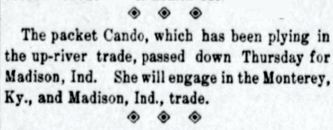
Maysville's Daily Public Ledger, August 12, 1905
![]()
| “The Owen News says: Mr. John D. White, a short time ago, caught at Herndon’s Mill, on Eagle Creek, two very fine large otters. One of them whipped seven dogs before it was killed.” from the Covington Journal, March 2, 1872 |
![]()
An earlier Gazetteer published in Louisville, was George W. Hawes’ Kentucky
State Gazetteer and Business Directory, for 1859 and 1860. It's
pre-Civil
War, but is erratic in its coverage. In Owen Co., it had detail on:
| New Liberty | Monterey |
![]()
| From Young & Co’s Business and Professional Directory of Kentucky, 1906-1907 | |
| Monterey | Gratz |
![]()

from Trow's Legal Directory of Lawyers in the United States, 1875
![]()
In a letter to the May 30, 1908 Frankfort Weekly News
and Roundabout, W. Len Hardin, the postmaster in Monterey,
says “No cause exists for night riders in Owen county. There is not a
tobacco bed in the county; not a pound
of tobacco will be raised in the season of 1908.” Why not? Details
here.
More details on Night Riders in Owen County are here.
On the other hand, a tobacco barn in Poplar Grove, which held Equity tobacco is burned, here.
Dying woman fired at by night riders
| “Carrollton, Ky., Nov. 13. - The big tobacco barn of A. A.
Lee, at Poplar Grove was destroyed by fire. Seventy-five hogsheads of fine
tobacco belonging to the American Society of Equity were burned. The fire
was incendiary in its origin, Officers are on the trail of the guilty
parties.” from the Hopkinsville Republican, November 16, 1907 |
![]()
Owen County toll road law amended in 1876.

| We can't tell you whether the unfortunate Mrs. Daily lived on the Owenton Pike in Owen or Franklin County, but we can tell you that toll roads became extremely unpopular in both. |
Courier-Journal reports in November, 1896, that Owen toll gates will be strictly guarded, and tolls enforced.
Courier-Journal reports in December 1896, that all 50 Owen toll gates have all been destroyed.
It's 1897, and they're still burning down toll houses.
| The Owen sheriff was petitioned in 1896 to put a question on the ballot: “Are you in favor of free turnpikes and gravel roads in Owen County, Kentucky?” Voters understood they would be raising their own taxes if they voted yes. 2,870 voted yes; 488 voted no. |
![]()
Owen County feature story from 1939.
Don't miss this one.
Howard W. Hardaway hikes throughout the county, and re-tells the tales he's told.
A feature on Owen County, at the American Bicentennial, 1976
Additional Links that apply to all of Northern Kentucky Views, and may or may not
be related to Owen County, are on the main Links & Miscellany page, here.
![]()

